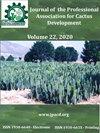Establishment of callus and cell suspension cultures of Ariocarpus retusus (Scheidweiler)
IF 0.4
4区 农林科学
Q4 HORTICULTURE
Journal of the Professional Association for Cactus Development
Pub Date : 2022-02-16
DOI:10.56890/jpacd.v24i.454
引用次数: 0
Abstract
Ariocarpus retusus is an endemic species of Mexico subject to special protection by the Mexican government due to its vulnerability to habitat disturbance. Previous studies have reported secondary metabolites in A. retusus with interesting biological activity. However, the use of these secondary metabolites has limitations. The aim of this study was to establish protocols for obtaining friable callus and cell suspension cultures that allow the subsequent development of strategies for obtaining secondary metabolites. Seedlings were obtained from seeds which were exposed to different concentrations of auxins and cytokinins to induce callogenesis. The callus generated was subcultured in Murashige and Skoog (MS) medium with modifications in the content of ammonium nitrate and potassium nitrate, and incubated in different photoperiod conditions (16:8 h light: dark and continuous darkness). Likewise, cell suspensions were established and characterized by friable callus. The MS medium supplemented with 2 mg/L 2,4-D, 2 mg/L BAP, and 3 mg/L KIN allowed the development of vigorous callus. Callus friability was enhanced by decreasing ammonium nitrate (410 mg/L) and increasing potassium nitrate (2850 mg/L). The absence of light during incubation induced friable callus. The addition of myo-inositol (3 mg/L) significantly (p = 0.000) influenced the increase in biomass of cell suspensions.羊蹄木愈伤组织的建立及细胞悬浮培养
Ariocarpus reusus是墨西哥特有物种,因其易受生境干扰而受到墨西哥政府的特别保护。以往的研究报道了兔耳螨的次生代谢物具有有趣的生物活性。然而,这些次生代谢物的使用有局限性。本研究的目的是建立获得易碎愈伤组织和细胞悬浮培养的方案,以便随后开发获得次生代谢物的策略。将种子分别置于不同浓度的生长素和细胞分裂素中,诱导其形成胼胝质。将产生的愈伤组织在修改硝酸铵和硝酸钾含量的Murashige和Skoog (MS)培养基中传代培养,并在不同的光周期条件下(16:8 h光照、黑暗和连续黑暗)培养。同样,细胞悬浮液的建立和特征是易碎的愈伤组织。在MS培养基中添加2mg /L 2,4- d、2mg /L BAP和3mg /L KIN,愈伤组织发育旺盛。减少硝酸铵(410 mg/L)和增加硝酸钾(2850 mg/L)可增强愈伤组织的脆性。培养过程中缺乏光照诱导出易碎的愈伤组织。添加肌醇(3 mg/L)显著影响细胞悬浮液生物量的增加(p = 0.000)。
本文章由计算机程序翻译,如有差异,请以英文原文为准。
求助全文
约1分钟内获得全文
求助全文
来源期刊

Journal of the Professional Association for Cactus Development
Agricultural and Biological Sciences-Plant Science
CiteScore
1.10
自引率
33.30%
发文量
10
期刊介绍:
The editors of the Journal of the Professional Association for Cactus Development, are very excited to be a part of the excellent editorial committee and to work together to create the synergism between scientists, growers, legislators, and business people so vital to the development of this industry to serve the people of arid lands.
 求助内容:
求助内容: 应助结果提醒方式:
应助结果提醒方式:


